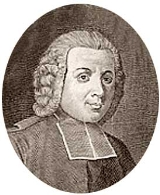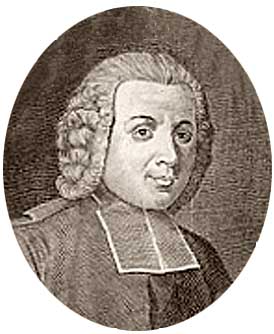
Jean-Baptiste Dubos
Encyclopedia
Jean-Baptiste Dubos also referred to as l'Abbé
Du Bos, was a French
author
.

. After studying theology
, he gave it up in favour of public law
and politics
. He was employed by M. de Torcy, minister of foreign affairs, and by the regent and Cardinal Dubois in several secret missions, in which he acquitted himself with great success. He was rewarded with a pension and other advantages. Having obtained these, he retired from political life and devoted himself to history and literature. He gained such distinction as an author that in 1720 he was elected a member of the Académie française
, of which, in 1723, he was appointed perpetual secretary in succession to André Dacier
. He died in Paris, repeating the remark, "Death is a law, not a punishment."
and England
). In an attempt to persuade those countries to adopt a policy of peace, he published a work entitled Les Intéréts de l'Angleterre mal entendus dans la guerre présente (Amsterdam, 1703). This work contained indiscreet disclosures and predictions that were not fulfilled. The enemy took advantage of the work, and a wag took occasion to remark that the title ought to be read thus: Les Intérêts de l'Angleterre mal entendus par l'abbé Dubos. It is remarkable as containing a distinct prophecy of the revolt of the American colonies from Great Britain
.
His next work was L'Histoire de la Ligue de Cambray (Paris, 1709, 1728 and 1785, 2 vols.), a full, clear and interesting history, commended by Voltaire
. In 1734 he published his Histoire critique de l'établissement de la monarchie française dans les Gaules (3 vols. 4to)--a work the object of which was to prove that the Franks had entered Gaul, not as conquerors, but at the request of the nation, which, according to him, had called them in to govern it. But this system, though unfolded with a degree of skill and ability that, at first, procured many zealous partisans, was victoriously refuted by Montesquieu
at the end of the thirtieth book of the Esprit des lois.
His Réflexions critiques sur la poésie et sur la peinture, published for the first time in 1719 (2 vols, but often reprinted in three volumes), constitute one of the works in which the theory of the arts is explained with the utmost sagacity and discrimination. Like his history of the League of Cambray, it was highly praised by Voltaire
. The work was rendered more remarkable by the fact that its author had no practical acquaintance with any one of the arts whose principles he discussed. Besides the works above enumerated, a manifesto of Maximilian II Emanuel, elector of Bavaria
, against the emperor Leopold
(relative to the succession in Spain
) has been attributed to Dubos from the excellence of the style.
Abbé
Abbé is the French word for abbot. It is the title for lower-ranking Catholic clergymen in France....
Du Bos, was a French
France
The French Republic , The French Republic , The French Republic , (commonly known as France , is a unitary semi-presidential republic in Western Europe with several overseas territories and islands located on other continents and in the Indian, Pacific, and Atlantic oceans. Metropolitan France...
author
Author
An author is broadly defined as "the person who originates or gives existence to anything" and that authorship determines responsibility for what is created. Narrowly defined, an author is the originator of any written work.-Legal significance:...
.

Life
He was born in BeauvaisBeauvais
Beauvais is a city approximately by highway north of central Paris, in the northern French region of Picardie. It currently has a population of over 60,000 inhabitants.- History :...
. After studying theology
Theology
Theology is the systematic and rational study of religion and its influences and of the nature of religious truths, or the learned profession acquired by completing specialized training in religious studies, usually at a university or school of divinity or seminary.-Definition:Augustine of Hippo...
, he gave it up in favour of public law
Law
Law is a system of rules and guidelines which are enforced through social institutions to govern behavior, wherever possible. It shapes politics, economics and society in numerous ways and serves as a social mediator of relations between people. Contract law regulates everything from buying a bus...
and politics
Politics
Politics is a process by which groups of people make collective decisions. The term is generally applied to the art or science of running governmental or state affairs, including behavior within civil governments, but also applies to institutions, fields, and special interest groups such as the...
. He was employed by M. de Torcy, minister of foreign affairs, and by the regent and Cardinal Dubois in several secret missions, in which he acquitted himself with great success. He was rewarded with a pension and other advantages. Having obtained these, he retired from political life and devoted himself to history and literature. He gained such distinction as an author that in 1720 he was elected a member of the Académie française
Académie française
L'Académie française , also called the French Academy, is the pre-eminent French learned body on matters pertaining to the French language. The Académie was officially established in 1635 by Cardinal Richelieu, the chief minister to King Louis XIII. Suppressed in 1793 during the French Revolution,...
, of which, in 1723, he was appointed perpetual secretary in succession to André Dacier
André Dacier
André Dacier , Latin Andreas Dacerius, was a French classical scholar and editor of texts. He began his career with an edition and commentary of Festus' De verborum significatione, and was the first to produce a "readable" text of the 20-book work.- Biography:Dacier was born at Castres in upper...
. He died in Paris, repeating the remark, "Death is a law, not a punishment."
Works
His first work was L'Histoire des quatre Gordiens prouvée et illustrée par des médailles (Paris, 1695), which, in spite of its ingenuity, did not succeed in convincing most people. At the beginning of the war of 1701 he was charged with different negotiations (both in the NetherlandsNetherlands
The Netherlands is a constituent country of the Kingdom of the Netherlands, located mainly in North-West Europe and with several islands in the Caribbean. Mainland Netherlands borders the North Sea to the north and west, Belgium to the south, and Germany to the east, and shares maritime borders...
and England
England
England is a country that is part of the United Kingdom. It shares land borders with Scotland to the north and Wales to the west; the Irish Sea is to the north west, the Celtic Sea to the south west, with the North Sea to the east and the English Channel to the south separating it from continental...
). In an attempt to persuade those countries to adopt a policy of peace, he published a work entitled Les Intéréts de l'Angleterre mal entendus dans la guerre présente (Amsterdam, 1703). This work contained indiscreet disclosures and predictions that were not fulfilled. The enemy took advantage of the work, and a wag took occasion to remark that the title ought to be read thus: Les Intérêts de l'Angleterre mal entendus par l'abbé Dubos. It is remarkable as containing a distinct prophecy of the revolt of the American colonies from Great Britain
Great Britain
Great Britain or Britain is an island situated to the northwest of Continental Europe. It is the ninth largest island in the world, and the largest European island, as well as the largest of the British Isles...
.
His next work was L'Histoire de la Ligue de Cambray (Paris, 1709, 1728 and 1785, 2 vols.), a full, clear and interesting history, commended by Voltaire
Voltaire
François-Marie Arouet , better known by the pen name Voltaire , was a French Enlightenment writer, historian and philosopher famous for his wit and for his advocacy of civil liberties, including freedom of religion, free trade and separation of church and state...
. In 1734 he published his Histoire critique de l'établissement de la monarchie française dans les Gaules (3 vols. 4to)--a work the object of which was to prove that the Franks had entered Gaul, not as conquerors, but at the request of the nation, which, according to him, had called them in to govern it. But this system, though unfolded with a degree of skill and ability that, at first, procured many zealous partisans, was victoriously refuted by Montesquieu
Charles de Secondat, baron de Montesquieu
Charles-Louis de Secondat, baron de La Brède et de Montesquieu , generally referred to as simply Montesquieu, was a French social commentator and political thinker who lived during the Enlightenment...
at the end of the thirtieth book of the Esprit des lois.
His Réflexions critiques sur la poésie et sur la peinture, published for the first time in 1719 (2 vols, but often reprinted in three volumes), constitute one of the works in which the theory of the arts is explained with the utmost sagacity and discrimination. Like his history of the League of Cambray, it was highly praised by Voltaire
Voltaire
François-Marie Arouet , better known by the pen name Voltaire , was a French Enlightenment writer, historian and philosopher famous for his wit and for his advocacy of civil liberties, including freedom of religion, free trade and separation of church and state...
. The work was rendered more remarkable by the fact that its author had no practical acquaintance with any one of the arts whose principles he discussed. Besides the works above enumerated, a manifesto of Maximilian II Emanuel, elector of Bavaria
Maximilian II Emanuel, Elector of Bavaria
Maximilian II , also known as Max Emanuel or Maximilian Emanuel, was a Wittelsbach ruler of Bavaria and an elector of the Holy Roman Empire. He was also the last Governor of the Spanish Netherlands and duke of Luxembourg...
, against the emperor Leopold
Leopold I, Holy Roman Emperor
| style="float:right;" | Leopold I was a Holy Roman Emperor, King of Hungary and King of Bohemia. A member of the Habsburg family, he was the second son of Emperor Ferdinand III and his first wife, Maria Anna of Spain. His maternal grandparents were Philip III of Spain and Margaret of Austria...
(relative to the succession in Spain
Spain
Spain , officially the Kingdom of Spain languages]] under the European Charter for Regional or Minority Languages. In each of these, Spain's official name is as follows:;;;;;;), is a country and member state of the European Union located in southwestern Europe on the Iberian Peninsula...
) has been attributed to Dubos from the excellence of the style.
Excerpts
"[O]ne of the greatest wants of man is to have his mind incessantly occupied. The heaviness which quickly attends the inactivity of the mind, is a situation so very disagreeable to man, that he frequently chooses to expose himself to the most painful excesses, rather than be troubled with it." Critical Reflections, I. I

